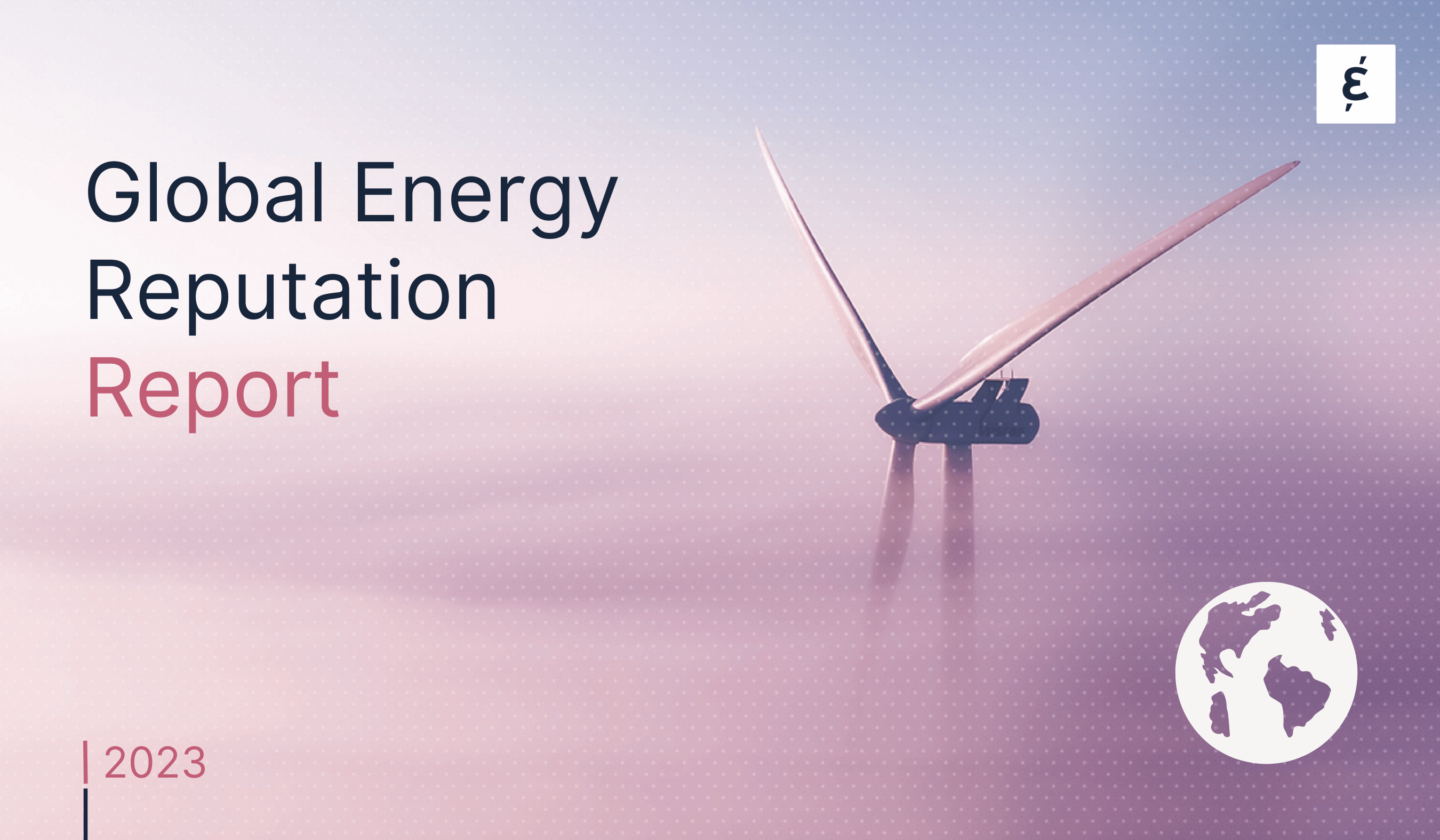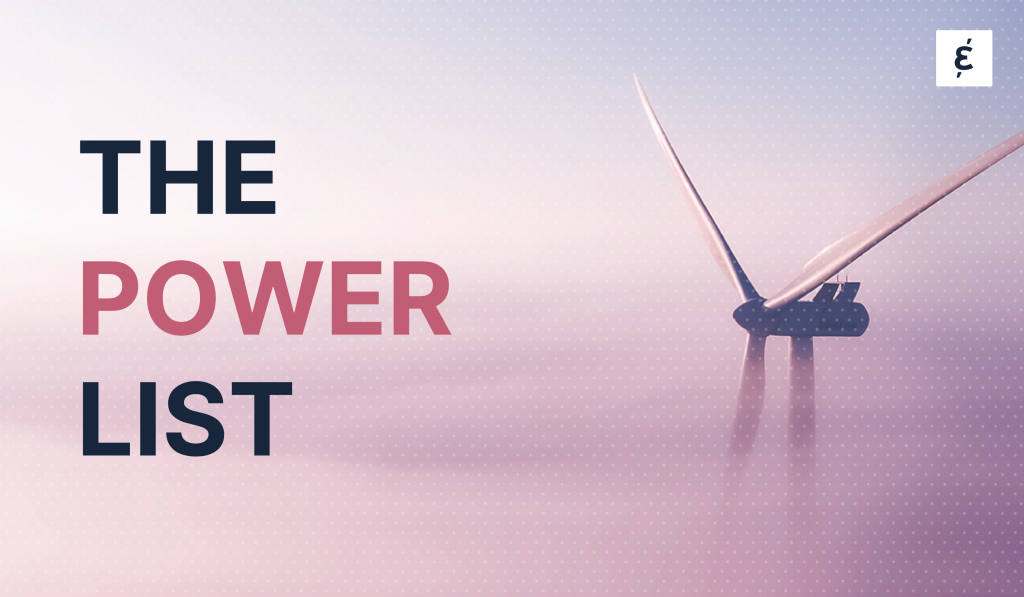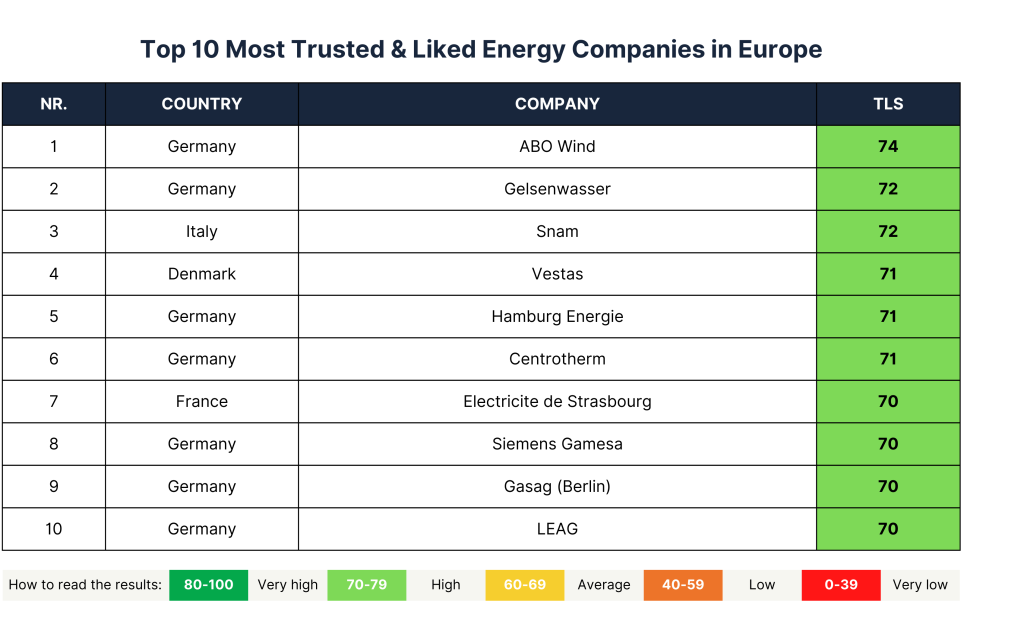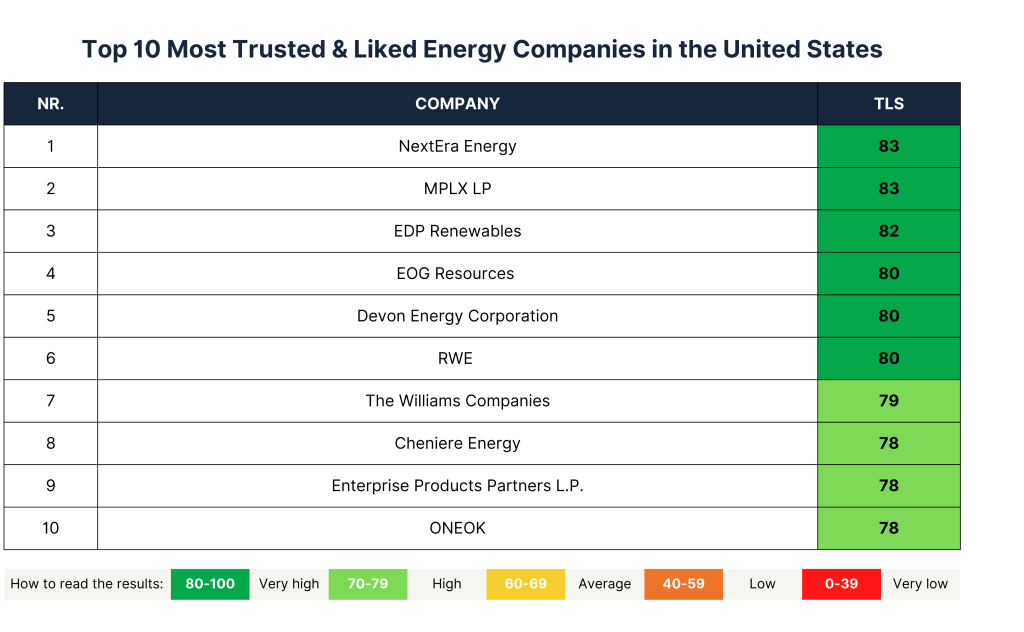
Global Energy Reputation Report 2023
Find out how world’s largest energy companies are perceived by their stakeholders in 2023.

Energy companies fuel the global economy and keep the lights on and the engines running.
Without them, the world would be a cold, dark place.
But as our most recent reputation report shows, energy companies have their work cut out.
The energy sector got an overall Trust & Like Score — our chief reputational metric — of 64.
A company’s Trust & Like Score is based on the degree to which survey respondents say they trust and like that company, meaning the sectoral score is the average of all companies.
A score of 64 ranks as Average — and, given recent headlines, it’s surprising it’s not lower.
After all, the past few years have seen rising household bills and petrol prices, concern about the security of supply, and the prominent role of fossil fuels in climate change.
And that’s challenged many of the energy industry’s stakeholders, especially their customers.

Find out how world’s largest energy companies are perceived by their stakeholders in 2023.
Below we take a look at which energy companies topped this year’s list in Europe and the US.
Together they’re helping shape the future of the world’s energy sector.
What unites almost all of the top European energy companies is green energy.
From leaders in renewables to companies pivoting to low-carbon energy, the top 10 companies in Europe share a commitment to sustainable solutions that stakeholders clearly approve and appreciate.
The picture in the United States is different.
Many of the top 10 energy companies by reputation are midstream service providers an involved in exploring for or producing crude oil and natural gas.
There are a couple of exceptions, however.
They include the most “trusted and liked” US energy company, NextEra Energy, which is committed to moving beyond “net zero”; EDP Renewables, which has doubled its clean energy generation since 2007; and the US division of German multinational energy giant RWE, which is now the fourth-largest renewable energy company in the US.

“Renewables are our DNA” says Europe’s most trusted and liked energy company, which develops and builds wind and solar farms as well as battery and hydrogen projects. The German firm operates in 16 countries and has more than 25 years of experience in renewable energy projects.
Trust & Like Score: 74 (Germany)
The Germany-based supplier of water, gas, electricity and heat says it’s on “team blue-green”, a nod to its strong commitment to sustainable energy solutions and to producing and distributing clean water, as well as wastewater treatment.
Trust & Like Score: 72 (Germany)
One of the world’s leading energy infrastructure companies, the Italy-based Snam says itsmission is “to guide the evolution of the energy sector, through the most innovative sustainable energy network” in Europe, which now more than 38,000 km long.
Trust & Like Score: 72 (Italy)
“Wind energy is our heritage and core competence”, says the Danish company which built its first wind turbine in 1979 and has never looked back. Today, Vestas is aiming to become “the global leader in sustainable energy solutions”, including wind and solar.
Trust & Like Score: 71 (Denmark)
Two years after its merger with Wärme Hamburg, the municipal energy company changed its name to Hamburgwe Energiewerke in February 2024. But its mission remains the same: to supply the Hanseatic city of Hamburg with natural gas, as well as green electricity in the form of wind and solar power.
Trust & Like Score: 71 (Germany)
The Germany-based company supplies technology and equipment for growth sectors such as the photovoltaics, semiconductor and microelectronics industries, but is also developing innovative solutions in fields such as fiber and battery production.
Trust & Like Score: 71 (Germany)
Founded in 1899, the Alsatian company is France’s second-largest electricity distributor. As part of its mission to “offer Alsace a future with low-carbon energy”, it’s looking to produce and supply more local renewable energy and increase “energy efficiency in its installations dedicated to its customers”.
Trust & Like Score: 70 (France)
“When the wind blows, we see infinite possibilities,” says the Hamburg-based company, which was formed in 2017 from the merger of Spanish and German wind engineering companies. Today it’s a leader in renewable energy and “working to provide the world’s best offshore and onshore wind turbines and services”.
Trust & Like Score: 70 (Germany)
“The future is now. Berlin’s energy is going green”, claims GASAG, a 176-year-old company that was recently sold by Vattenfall to the state of Berlin and is the main provider of natural gas in the German capital, with around 14,000 kilometers of gas networks in the Berlin and Brandenburg region.
Trust & Like Score: 70 (Germany)
LEAG is the joint umbrella brand for a group of energy companies in Germany. One of the top five electricity producers in the country, LEAG provides power for millions of households and businesses and has realigned its business strategy to drive more sustainable energy solutions.
Trust & Like Score: 70

With its commitment to moving beyond “net zero”, NextEra Energy produces electricity through wind, solar and natural gas, and operates nuclear power units via subsidiaries. Its strategy is to leverage low-cost renewables to drive energy affordability and independence and reduce fuel price volatility.
Trust & Like Score: 83
Headquartered in Ohio, MPLX is a limited partnership formed by Marathon Petroleum Corporation. It acquires, owns and operates crude oil and other hydrocarbon-based product pipelines and processing assets, especially in the Appalachian region.
Trust & Like Score: 83
The North American division of Spain’s EDP Renewables, the company has more than doubled its clean energy generation since 2007, becoming one of the top five renewable energy producers in the US in operating clean energy capacity. Today it generates more than 8,400 MW of renewable energy including 12 solar parks and 60 wind farms.
Trust & Like Score: 82
Headquartered in Houston, EOG Resources is one of America’s largest independent crude oil and natural gas exploration and production companies, with proved reserves in the US and Trinidad & Tobago. It says it’s focused on being “among the lowest cost, highest return and lowest emissions producers, and playing a significant role in the long-term future in energy”.
Trust & Like Score: 80
Founded in 1971 and headquartered in Oklahoma City, Devon Energy is a leading independent oil and natural gas exploration and production company, with onshore operations in the US. Twenty years ago, Devon was one of several petroleum companies that introduced shareholder resolutions requiring them to monitor their effects on climate change.
Trust & Like Score: 80
The US division of German multinational energy giant RWE has around 1,500 employees and plays a key role in RWE‘s strategy to become carbon neutral by 2040. It operates the fourth-largest renewable energy company in the U.S. and its second-largest solar owner and operator, present in most states.
Trust & Like Score: 80
Founded in 1908 and headquartered in Oklahoma, the Williams Companies produces about a third of the natural gas used daily in the US.
Its core business is natural gas processing and transportation and it owns strategic assets in the Gulf of Mexico, the Rockies, the Pacific Northwest and the Eastern Seaboard.
Trust & Like Score: 79
Cheniere is a full-service LNG provider, buying natural gas in North America, processing it into LNG for delivery onto customers’ vessels or to regasification facilities around the world. After launching operations in 2016, it is already the largest producer of LNG in the US and the world’s second-largest LNG operator.
Trust & Like Score: 78
Founded in 1968 and headquartered in Houston, Enterprise Products Partners “provides midstream energy services to producers and consumers of natural gas, natural gas liquids, crude oil, refined products and petrochemical”. Its network connects North American producers with international markets and domestic consumers.
Trust & Like Score: 78
Founded in 1906 and headquartered in Oklahoma, ONEOK is one of the largest energy midstream service providers in the US and a major player in the natural gas industry. Its operations include a 61,000-km integrated network of pipelines, processing plants, fractionators and storage facilities.
Trust & Like Score: 78
A closer inspection of our recent report on the reputation of the world’s leading energy companies helps explain the composition of these two lists, especially in Europe.
We asked people to pick three issues they feel are the most important for energy companies to address.
Here are the top five answers:
A closer inspection of our recent report on the reputation of the world’s leading energy companies helps explain the composition of these two lists, especially in Europe.
We asked people to pick three issues they feel are the most important for energy companies to address.
It’s almost certain that many stakeholders who participated in our survey saw some, if not all, of these factors in each of the energy companies that made the top 10 in Europe and the US.
The importance of reducing carbon emissions, transitioning to clean and renewable energy, and investing in modern technologies seems key to understanding the reputational standing of many energy companies.
More generally, our report illuminates several ways that energy companies could potentially improve their brand and reputation with stakeholders.
For example, while older people want the energy sector to focus mainly on supply and on reducing emissions, younger people also want the energy industry to promote social justice, support local communities and ensure they have diverse and inclusive workplaces.
Second, our report reveals that only 1 in 3 people can name the exact energy source that powers their home. This suggests a surprising lack of consumer knowledge and education about energy sources and the “energy journey” from extraction to power outlet.
In other words, if consumers don’t know “how the sausage is made”, energy companies can potentially do more to educate people about where their energy comes from. Indeed, energy firms can use that narrative to communicate their initiatives and improvements — and deepen their relationship with consumers.
Third, our report reveals that energy companies could differentiate their consumer-directed communication more by age group, in order to inspire them, be more relevant, and reestablish authenticity. That is, by helping people be better energy consumers — with a focus on both price and the environment — energy companies could help build a better reputation.
Download the full energy sector reputation report. Or, to learn more about how we can help your company understand your stakeholders better and become more trusted, drop us a line.
© 2024 Group Caliber | All Rights Reserved | VAT: DK39314320